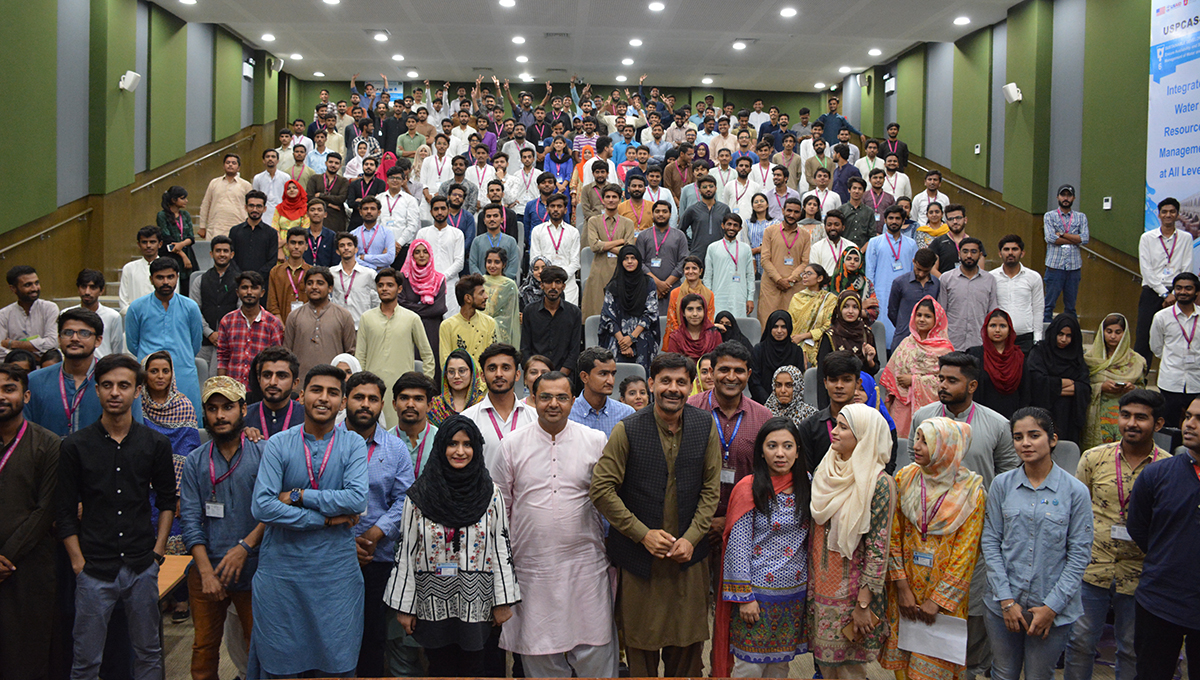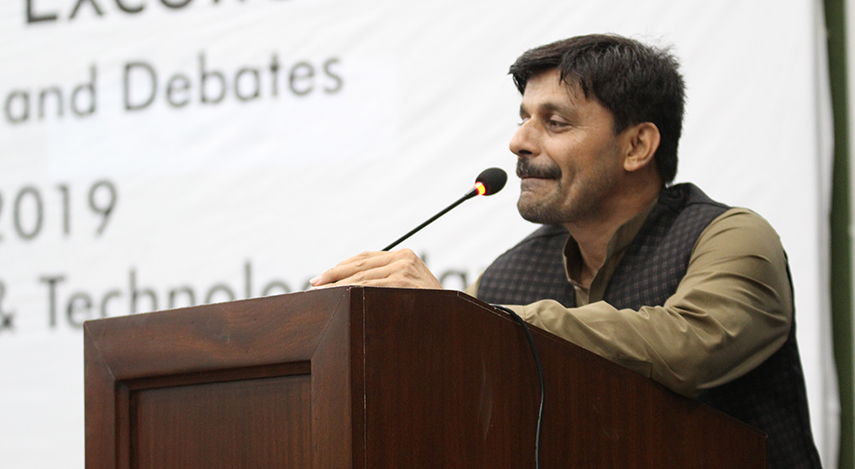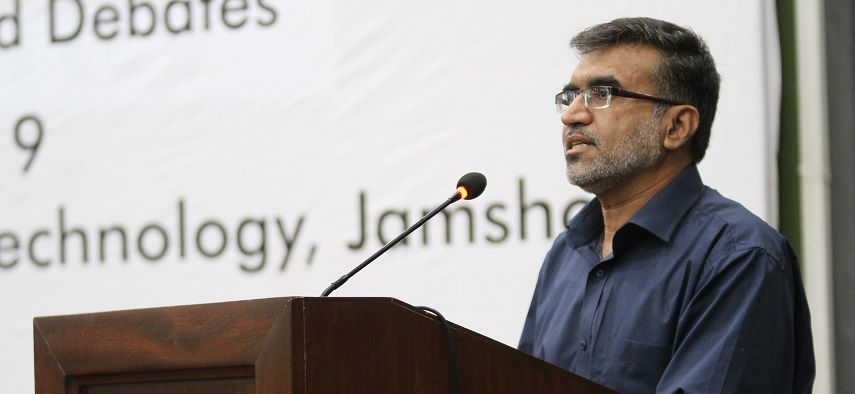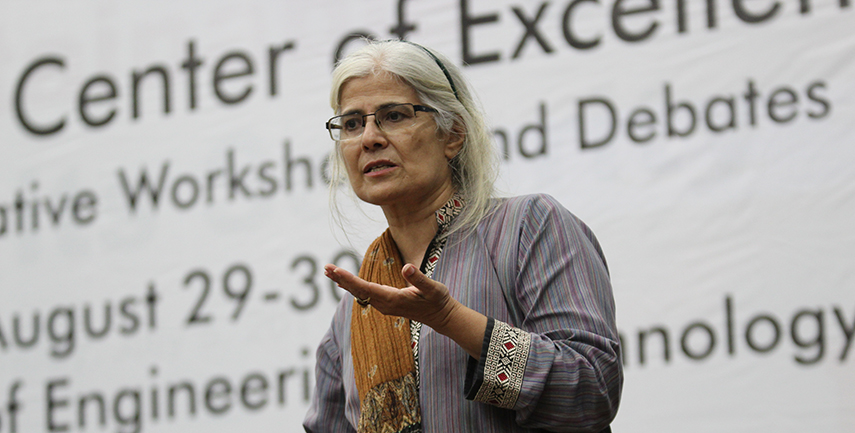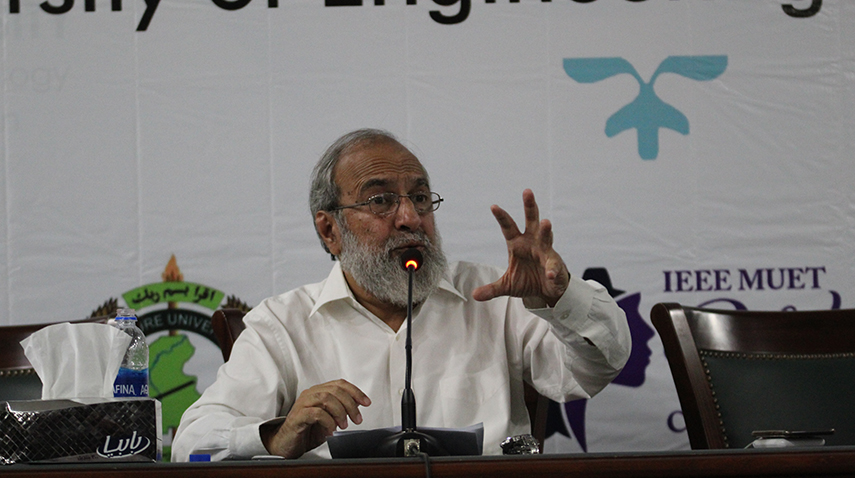The Center for Research and Security Studies (CRSS) conducted the seventh two-day PACE Collaborative workshops and debates for university students, on August 29-30, 2019, in Jamshoro. The workshop was held at Mehran University of Engineering and Technology (MUET), Jamshoro. It was organized under the umbrella of the Pakistan Center of Excellence (PACE), a counter-radicalization and pluralistic values’ focused project, in collaboration with the Dutch Government.
Participants included students from Mehran University of Engineering and Technology and University of Sindh, Jamshoro. Prof. Dr. Tanweer Hussain started off the workshop with a welcome note to all the participants including students, faculty members and the Vice Chancellor, MUET. He thanked CRSS for organizing the seminar at their campus and engaging youth in such fruitful activities. Moreover, he was of the view that these activities are the need of the day because it is crucial for Pakistan to fight against extremist narrative. The nation of Pakistan needs to be united on one narrative in order to curtail the threats of extremism and radicalism. He quoted a verse from the Holy Quran that translated as “Allah commands all the human beings to not spread violence on earth.” Dr. Hussain appreciated the role CRSS is playing in order to shape the minds of youth in positive direction and bringing up crucial topics of peace and harmony.
Vice Chancellor, MUET, Prof. Dr. Mohammad Aslam Uqaili also addressed the participants of the seminar and shared his views on countering extremism in Pakistan. The Vice Chancellor said, “I am glad to see the youth gathered for a cause today and playing their role as change agents of future”. There is no dearth of minds and intellect in our country, all we have to do is to direct and guide them to a path of positivity and understanding. We have so much diversity in our country which is the real beauty of Pakistan. We have produced people like Dr. Abdus Salam who has brought a good name to the country. We should respect the diversity and provide equal opportunities for all without any discrimination of religion, culture, ethnicity, race, language and gender. Living together in a society with so much diversity needs tolerance and we don’t need any resources to develop the habit, he added. Our religion teaches us the same lesson of respecting differences. The Vice Chancellor at the end appreciated CRSS for organizing the event at their university and providing an opportunity for their students to comprehend diversity.
Director Pakistan Studies Center, University of Sindh, Prof. Dr. Shuja Ahmed Mahesar also shared his views on the topics of equality, diversity and tolerance. Dr. Mahesar said, “it is an honour for me to be a part of this very important seminar”. Lack of tolerance, now a days, is the main issue we are facing in Pakistan. By organizing such events, we can transform the mindsets and inculcate critical values of diversity, equality, rule of law, democracy, accountability and tolerance among our youth.
Ms. Farhana Kanwal, Project Manager PACE, during her introductory remarks said that PACE is a counter radicalization initiative by CRSS which was started in September, 2015 and completed its first phase in September, 2018. The core objective of PACE is to indoctrinate the tradition of questioning and critical thinking among the youth of Pakistan. She added that the purpose of such activities is to bring together the youth at one platform and discuss about critical issues of multiculturalism, diversity, democracy and accountability. Youth is the shaper of future and whole objective of reaching out to them is to prepare a cadre of young people equipped with the tools of critical thinking. We believe that today’s younger generation has the ability to adopt new ideas and question preconceive narrative of intolerance. She stressed on questioning to start the process of positive transition of a society. She also stressed on including all the marginalized groups for a greater cause of peace-building and social cohesion. Ms. Farhana elaborated on the success and achievements of PACE in its first phase and also the objectives of PACE evolution.
The first formal session of the day was kicked off by Mr. Masood Anwar on ‘Ethics in Media’. Mr. Anwar said that ethics and media are two different words. First, we will elaborate on the definitions of both terms and then we will look into the possibilities and aspects of ethics in media. Ever since human being came into this world, this medium also came into existence. The word media means to communicate your thoughts and emotions to others. However, ethics means the manner of doing something; either good or bad. Right and wrong is a relative term, because whatever is right for a person might be wrong for another person. We need specialized people in the field of media, because currently we have some very unprofessional people as journalists and reporters who believe in sensationalism and exaggeration only. He also gave an insight on reporting and journalistic values for it is very important to report facts with credibility. He added that authenticity and credibility of the information provides strong basics for good journalism.
Ms. Afia Salam spoke on ‘Respect for Diversity, Rights and Opinions,’ in her session. The session comprised of discussion revolving around how people differentiate themselves and show affiliation toward their ethnic and religious backgrounds. She also discussed that considering 3% of our population constitutes of various religious minorities, we should acknowledge and respect people that have different beliefs and values. Institutional structures can play a vital role in promoting the virtues of respect for diversity and help bridge the gap that exists due to biased religious mindsets alongside working on alternative narratives to help smooth the process, she added.
On second day, Dr. Khalid Zaheer spoke on ‘Religious Freedom, Fundamental Rights and Social Inclusion.’ Dr. Khalid Zaheer is a renowned religious scholar and an expert on religious teachings and interpretation. Dr. Zaheer explained the concepts of religious freedom and social inclusion with reference to Quranic verses. Our religion strongly advocates religious freedom and doesn’t like imposition of beliefs and ideas on others, he remarked. He said that the Holy Quran is internally consistent and there is no contradiction in it. However, some of the verses are interpreted differently to create chaos, and sometimes for personal gains by some religious scholars. Allah describes humans as sons and daughters of Adam and Eve, to bring them all in an equal position; despite being their religion, race, ethnicity, language, culture and gender difference. Islam gives equal rights to all without any discrimination and whoever discriminates is going against its teachings.
He said that religious tolerance is a right everyone should give to others, to believe in and practice faith of their choice. Fundamental human rights, a guarantee in Islam and the last sermon of our Holy Prophet (PBUH) gives an elaborative explanation of it. The sermon is the best example of inclusion by ensuring the rights of all marginalized groups.
Last session of the seminar was conducted by Ms. Fatima Rind, who is a UN youth volunteer and a motivational speaker. Her session was ‘Civic Education and Constitutional Rights.’ She deliberated that the Constitution of Pakistan gives equal rights to all its citizens with no discrimination, but along with that there are certain responsibilities as well that we have to abide by. We, as citizens of Pakistan, have to ensure the rule of law and accountability, and that is only possible if we read and understand the Constitution of Pakistan. It is very important to understand that we can not ask for our rights until we are ready to perform certain duties. We have lately witnessed heavy rains in Sindh and specifically in Karachi. The poor waste management created a chaotic situation. We can easily put blames on the state but we also need to understand our role that could probably help the situation, she added. We casually throw wrappers and garbage out of the cars and houses and not even think once about the impact it is going to produce. She explained the structure and hierarchy of state which can address the issues. She added that we don’t need to be violent for addressal of the issue but should take individual responsibility for our actions.
At the end, Prof. Dr. Tanweer Hussain acknowledged CRSS for their role in peacebuilding efforts, and working towards a society with equal rights for all. He said that we would be happier to collaborate in future as well for organizing such events.
Ms. Farhana Kanwal closed the session with highlighting the importance of debates and critical thinking. She said that debate is a way of identifying and discussing the issues with logic and reason. She further said that an ideal society would always look beyond differences and there will be respect of rights and opinions for all, with no discrimination. Ms. Kanwal also thanked the participating universities and students for their support and encouragement throughout the seminar.

